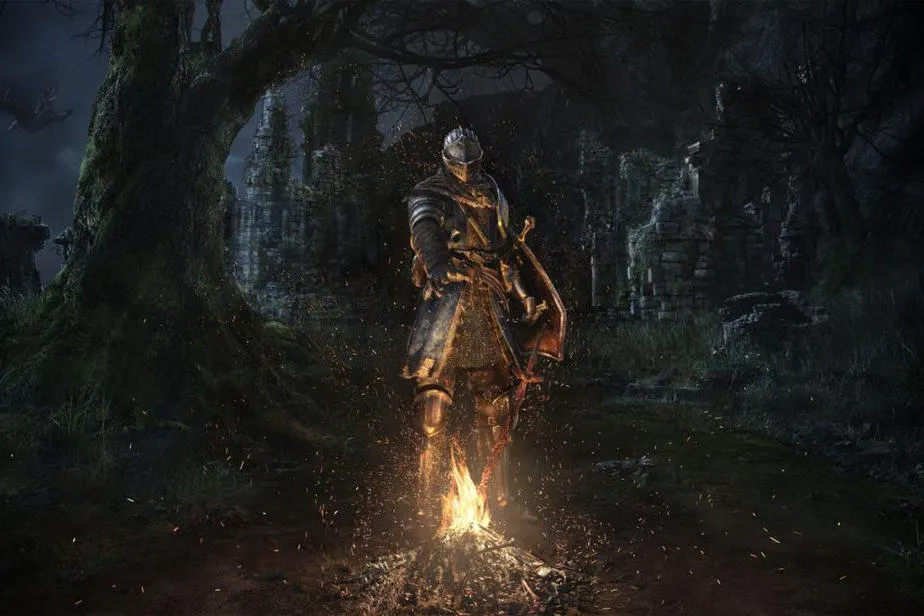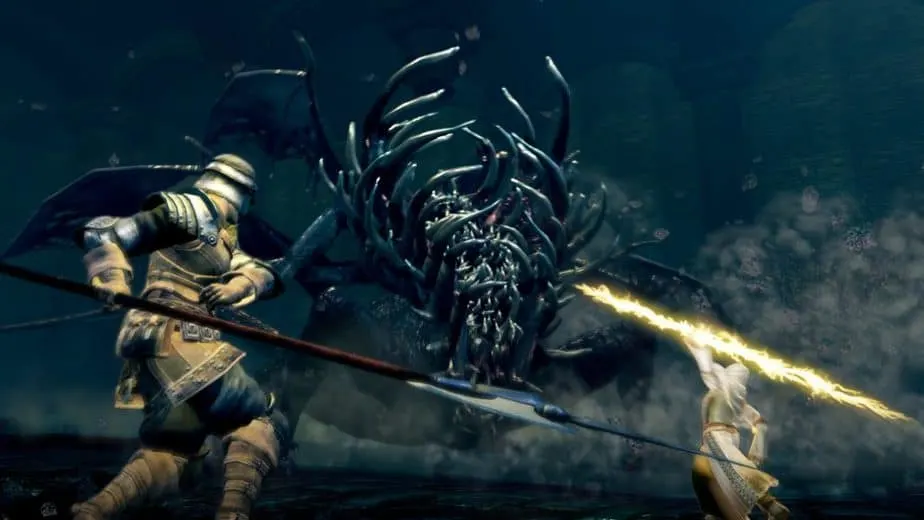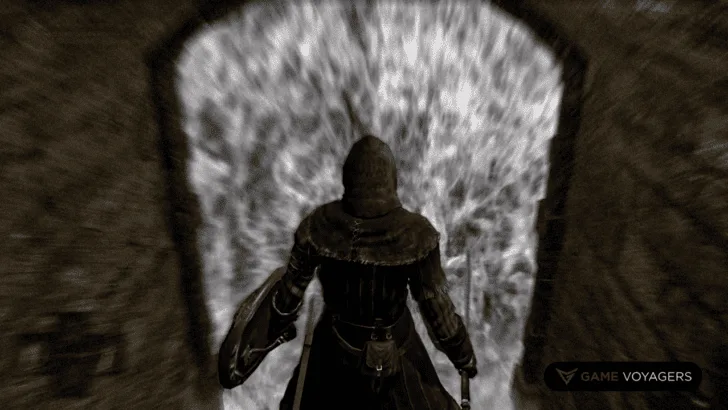The Wanderer is one of the ten starting classes available to players in Dark Souls Remastered. It also happens to be one of the best beginner classes for players that are new to the series.
To most players, the incentive of playing Wanderer is the extra Dexterity combined with starting with a Scimitar, a much friendlier and easier to wield weapon than other Dex classes like the Thief’s Bandit Knife.
That’s a fair enough reason to pick the Wanderer class, but you would be missing out on one of its biggest strengths: the bonus Intelligence and Attunement.
The Wanderer starts with higher Attunement and intelligence as well as Dexterity, making it a great candidate for builds that combine Sorcery with Dexterity weapons.
This versatility is what makes the Wanderer class so powerful for beginners. It allows you to lean into various builds without committing to any specific playstyle.
Effective Wanderer Combat
Effective Wanderer combat will differ significantly from player to player, as well as what stage of the game you’re in.
The Wanderer’s biggest strength is just how many options it leans into. Some players are going to prefer to go all-in on a Sorcery playstyle, whereas others will focus on Dexterity-scaling weapons.
As a result, it’s hard to recommend a one-size-fits-all combat style. However, we can give you some early game combat tips and advise you on how to play a Dexterity Wanderer, a Sorcery Wanderer, and a hybrid build.
Early Game Wanderer Combat
You will not have access to too many spells in the early game. So, you will want to take advantage of your Scimitar and Leather Shield as much as possible. This means approaching combat traditionally, similar to other strictly Strength or Dexterity classes.
One thing you need to keep in mind is that the Wanderer is pretty weak in the early game. In fact, this is the biggest drawback to the class and something new players will struggle to deal with. Your increase in Intelligence, Dexterity, and Attunement comes at the cost of Vitality. Combine that with the light Wanderer starting armor, and you’ll not be able to tank as much as some heavier classes.
This means you have to be more cautious in your early-game playstyle. Don’t overcommit to fights, and take your time to get comfortable with enemy attack patterns and your own weapon.
Being able to absorb less punishment than usual will teach newer players some valuable skills in survivability and dynamic combat, albeit at the cost of a few more early-game deaths.
Mid/Late Game Wanderer Combat
Once you get over the early game Wanderer hurdles, you’ve got much more room for customization in how you approach combat.
Like all classes in Dark Souls Remastered, Wanderer doesn’t lock you into any style of play. All it does is determine your starting gear and stat distribution. It’s only critical for min/maxing. Nothing stops you from choosing Wanderer and then deciding to use a Strenght build. You shouldn’t do that, but you can.
In other words, your mid-to-late game combat will be entirely determined by how you want to play the game. If you’ve opted to learn about your Spell-usage, you can keep your distance and attack at range.
If you’ve gone hardcore into Dexterity, you will want Dex-scaling weapons capable of outputting serious damage numbers. If you’re a hybrid, you can afford to play a little looser and riskier with your melee combat because you have spells to fall back on when things get dicey.
As long as you’re actively adapting your approach to combat to suit your build, you will do just fine. Well, maybe not OK, but you will get there sooner or later.
Essential Steps

There’s very little in the way of “Essential Steps” for the Wanderer class because it is versatile. You’re not pigeonholed into requiring any particular items, Sorceries, or weapons. That being said, there are a few basic recommendations that I can provide:
- If you’re a new player, choose the Tiny Being’s Ring as your starting gift. This will give you a bit of extra health to make up for your early-game weakness.
- Consider bumping your Faith up to 12 and getting the Heal Miracle. Like the Tiny Being’s Ring, this will give you extra survivability.
- Decide whether you want to focus on Dexterity or Pyromancy for combat, and get the essential Spells/Weapon required for your choice.
- Begin optimizing your stat distribution for your playstyle of choice.
Those are the basic steps you’ll need to, or should, take at specific points in your Wanderer playthrough. They’re far from necessary or exhaustive, though.
For example, an experienced player might opt to take the Master Key over the Tiny Being’s Ring as their starting gift. They might also be min/maxing, meaning they’ll skip out on putting four points into Faith, thus missing Heal.
You could even decide to create a quality build with your Wanderer by putting points into both Strenght and Dexterity. You’ve got many options, so don’t feel weighed down by any particular “must-do” steps.
Sorcerer Wanderer Build
Attributes
- DEX – 40. We’re not relying on Dexterity scaling with this build. Instead, we push Dex up to 40 for an increased casting speed. The faster you cast spells, the more you cast, and the more damage you do.
- INT – 44. It might seem odd to invest 44 points into Intelligence, but there’s a reason. The Crystal Soul Spear Sorcery unlocks at 44 Int and will be one of our go-to late-game spells for this build.
- ATN – 19. We’re only rocking an Attunement of 19 for five slots. If you want more, you can invest more into ATN, but be aware that it comes with diminishing returns.
- STR – 16. We’re investing in Strength up to 16, so we can use the Moonlight Great Sword.
As you can see, we’ve only covered the essential stats for this Sorcerer build. Unlike a pure Dex build, a Wanderer Sorcerer build requires a lot more investment to do work.
You’ll have less room to put points into your Vitality and Endurance, so we recommend you split it in a rough 1.5/1 ratio of Vit to End. Depending on how you play, you can change that around, but be aware that you’ll start approaching glass cannon territory if you pull more points from Vitality.
Equipment
- Moonlight Great Sword.
- Logan’s Catalyst.
The Moonlight Great Sword is our go-to weapon for this build. It fully scales with Intelligence and doesn’t use much stamina, making it a damage-dealing powerhouse for both PvP and PvE.
If you’re not a fan of Moonlight, you could go with something like a Balder Side Sword combined with Crystal Magic Weapon. This will still give you good range and damage, but it does take a little bit more micromanagement to maintain.
Logan’s Catalyst requires a lot of work, but it’s more than worth it. While it doesn’t hit the damage numbers that some other catalysts do, it will give you many spell uses. That’s much more important in PvE than maximizing how much each spell hits for.
Spells
- Crystal Soul Spear
- Homing Crystal Soulmass
- Crystal Magic Weapon
You’ve got 5 spell slots to work with, so you have room for two more Sorceries of your choice. In fact, you can cut out Crystal Magic Weapon if you plan on using the Moonlight Great Sword, meaning all you need to have is Crystal Soul Spear and Homing Crystal Soulmass.
Soul Spear will be your go-to ranged attack for dealing massive damage, which Crystal Soulmass will help add to your DPS once you get in range to start attacking with your sword. All you need is these two to melt enemies.
If you wanted to fully invest in the glass-cannon style, push your Intelligence up to 50 and use White Dragon Breath in conjunction with Soulmass and Soul Spear, but that’s getting into overkill territory.
Dexterity Wanderer Build
Our first Dark Souls Remastered Wanderer build will focus, more or less, entirely on Dexterity. We will take advantage of the class’s naturally high Intelligence to get our hands on Soul Arrow, but that’s as far as we’re taking Sorceries with this build.
Given the natural versatility of Wanderer, feel free to change anything you don’t like about our build. If you want to use different weapons or spells, you can. This build is simply a skeleton of what a good Dexterity Wanderer build looks like. It’s up to you to put meat on its bones and adjust it to suit your needs and playstyle.
Attributes
- VIT – 30. Vitality hits a soft cap at 30, so there isn’t much of a point going over that limit, although you can push it up to 50 if you need the extra health.
- END – 40. Endurance dictates your stamina. This means more room for error with your combat pacing for newer players. High endurance is essential for most DS Remastered builds because it lets you get more attacks off.
- DEX – 40. Pushing our Dexterity up to the soft cap of 40 is the bread and butter of this build. This is where all of our damage is going to come from.
- STR – 14. The only reason we’re investing points into Strength is to meet the stat requirement for our weapon of choice. If you’re not a fan of our weapon, you can decrease or increase STR commitment to suit your own weapon choice.
- INT – 18/ATN – 16. Having 18 Intelligence gives us access to more Sorceries to help lean into a hybrid playstyle. 16 Attunement gives us extra Sorcery slots.
This Dexterity Wanderer build is pretty simple, but that doesn’t stop it from being incredibly practical.
It’s fully customizable to suit your needs. If you are dying a lot, invest up to 50 soft caps in Vitality. If you don’t need the extra stamina, pull Endurance down to 30 and put those points into Intelligence for more spell damage.
The only hard requirement for this build is having a Dexterity of 40, so we can scale our weapon of choice.
Equipment
- Great Scythe.
- Oolacile Ivory Catalyst.
There isn’t much in the way of mandatory equipment or armor for this build. Again, this comes down to the level of versatility you have.
We’re recommending the Great Scythe as it’s one of, if not the best, Dexterity weapons in the game. However, you can easily swap it out for any other Dex-scaling weapon you prefer.
If you decide to stick with the Great Scythe, you can find it in The Catacombs. This means you can get it early in your run, giving you plenty of time to get used to its moveset.
Speaking of its moveset, your one-handed set is highly versatile. It gives you deceptively good range and consumes much less stamina than many other weapons of the same caliber.
Make sure that when you upgrade it, you take the regular path to +15. Otherwise, you’ll lose your Dex scaling and a lot of damage.
The Oolacile Ivory Catalyst is our Catalyst of choice for casting in the early game. While this is a Dexterity build, we still like taking some time and stat points to access a handful of useful Spells. Specifically, we’re going to be utilizing Soul Arrow.
Spells
- Soul Arrow
Plenty of Sorceries work well with this build, but all of them require different commitments while you’re leveling. We recommend you decide which you want to use in advance and plan out your stat point distribution according to that.
That being said, Soul Arrow is relatively inexpensive to access, both in terms of how you get it and how much Intelligence you need to use it.
Soul Arrow is ranged sorcery, which gives us even more versatility in approaching combat. It deals good damage and is perfect for softening targets before engaging them with your primary weapon.
It also scales well throughout your playthrough, with Great Soul Arrow and Great Heavy Soul Arrow being helpful in the late/end game.
Best Wanderer Spells

- Great Soul Arrow.
- Crystal Soul Spear.
We’ve recommended a handful of different spells throughout this Wanderer class guide, but these two are easily the best in terms of damage and utility.
Suppose you’re more interested in Dexterity play over Intelligence. In that case, Soul Arrow is a tremendous technical option to add some range to your arsenal for little to no investment in terms of stat points.
On the other hand, Crystal Soul Spear is a beefy ranged Sorcery for anyone more inclined to play as a Sorcerer over a Dexterity sword user. It requires a lot more investment, meaning you’ll have fewer points to invest in Vitality and Endurance, but it makes up for that with how much damage it outputs.
Ultimately, it comes down to whether you want to sacrifice survivability for power. With Intelligence builds, you’ll always be as squishy as you are at the start of the game compared to Dexterity builds.
Best Wanderer Weapons
- Great Scythe.
- Moonlight Great Sword.
Again, the difference between these two weapons comes down to the difference between Dexterity and Intelligence.
Both the Great Scythe and Moonlight Great Sword scale with Dex and Int, respectively, so your choice should be pretty black and white, depending on what build you decide to play.
There are other options, such as the Balder Side Sword and Katana, so if you don’t like how either of these feel in combat, don’t feel pigeon-holed into using them. Experiment with different weapons to see which you prefer.

